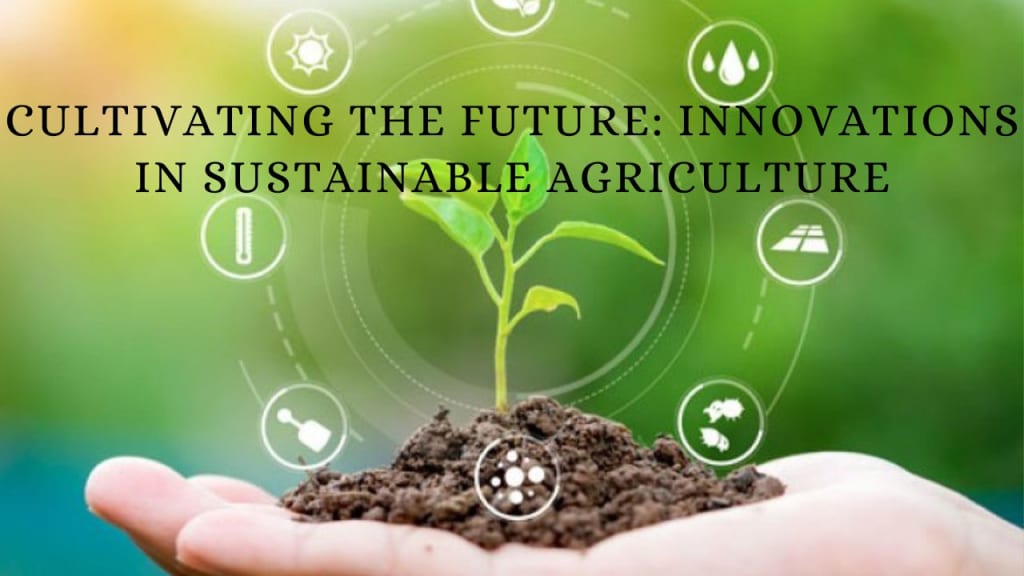Cultivating the Future: Innovations in Sustainable Agriculture
Sustainable agriculture is a pressing concern in our rapidly changing world.

Sustainable agriculture is a pressing concern in our rapidly changing world. With growing populations, shrinking arable land, and the detrimental effects of climate change, it is crucial that we adopt innovative practices to ensure the long-term viability of our food production systems. This blog will explore some of the most exciting innovations in sustainable agriculture that are revolutionizing the way we grow food, protect the environment, and cultivate a better future for generations to come.
Vertical Farming
One of the most promising innovations in sustainable agriculture is vertical farming. By growing crops indoors in vertically stacked layers, this method maximizes space utilization, reduces water consumption, and minimizes the need for harmful pesticides. Vertical farms also have the advantage of being located closer to urban areas, reducing transportation costs and emissions.
Precision Agriculture
Precision agriculture employs advanced technologies, such as GPS, remote sensing, and data analytics, to optimize resource use and increase crop yields. By precisely monitoring soil conditions, moisture levels, and plant health, farmers can tailor their irrigation, fertilization, and pest control strategies. This targeted approach minimizes waste and reduces environmental impact while maximizing productivity.
Agroforestry
Agroforestry integrates the cultivation of trees and crops in the same area, creating a mutually beneficial relationship. The trees provide shade, windbreaks, and habitat for beneficial organisms, while the crops benefit from improved soil fertility and reduced water evaporation. Agroforestry systems are highly sustainable, promoting biodiversity, reducing erosion, and sequestering carbon dioxide from the atmosphere.
Hydroponics
Hydroponics is a soil-less farming technique that involves growing plants in nutrient-rich water solutions. This method conserves water by recycling it within the system, minimizes the use of pesticides, and allows for year-round production. Hydroponics is especially valuable in arid regions or areas with poor soil quality, as it provides a controlled environment for optimal plant growth.
Aquaponics
Aquaponics combines aquaculture (fish farming) and hydroponics in a symbiotic system. Fish waste provides nutrients for the plants, while the plants purify the water for the fish. This closed-loop system requires less water and eliminates the need for synthetic fertilizers. Aquaponics is an excellent example of sustainable agriculture, as it produces both fish and vegetables, promoting food security and resource efficiency.
Biological Pest Control
Rather than relying on chemical pesticides, sustainable agriculture emphasizes the use of biological control methods. Beneficial insects, such as ladybugs and parasitic wasps, are introduced to prey on pests, reducing the need for harmful chemicals. This approach protects the ecosystem's balance and preserves biodiversity while effectively managing pests.
Cover Crops
Cover crops, also known as green manure, are crops grown between main crop seasons to protect and enrich the soil. Cover crops suppress weed growth, prevent erosion, and improve soil structure. They also act as natural fertilizers by fixing nitrogen, reducing the need for synthetic inputs. Cover cropping is a simple yet powerful practice that enhances soil health and promotes sustainable agriculture.
Renewable Energy Integration
Sustainable agriculture aims to reduce reliance on fossil fuels by integrating renewable energy sources. Solar panels, wind turbines, and biogas systems can power farm operations, reducing greenhouse gas emissions and energy costs. Renewable energy integration aligns agricultural practices with the principles of sustainability, contributing to a greener future.
Blockchain Technology
Blockchain technology is making its mark in sustainable agriculture by enhancing supply chain transparency. With blockchain, consumers can trace the journey of their food from farm to table, ensuring ethical and sustainable production practices. This technology empowers consumers to make informed choices, supports fair trade, and encourages environmentally responsible farming methods.
Agroecology
Agroecology emphasizes the integration of ecological principles into agricultural systems. It promotes biodiversity, enhances soil health, and maintains ecological balance. Agroecological practices such as crop rotation, polyculture, and composting reduce the reliance on synthetic inputs, build resilience against pests and diseases, and foster sustainable food production.
Conclusion
Cultivating the future of sustainable agriculture relies on embracing innovative practices that prioritize environmental stewardship, resource efficiency, and long-term viability. Vertical farming, precision agriculture, agroforestry, hydroponics, aquaponics, biological pest control, cover cropping, renewable energy integration, blockchain technology, and agroecology are just some of the many innovations driving this positive change. By adopting these practices, we can transform our food systems, protect the planet, and ensure a sustainable future for generations to come. Let us harness the power of innovation and cultivate a greener, more resilient future through sustainable agriculture.
About the Creator
Odia Feedback
odiafeedback.com is a Professional odiafeedback.com Platform. Here we will provide you with only interesting content, which you will like very much.
Website: https://odiafeedback.com/






Comments
There are no comments for this story
Be the first to respond and start the conversation.